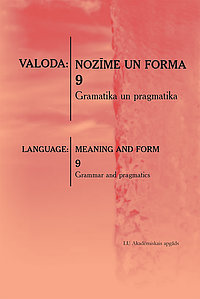Atbildes uz jautājumiem mutvārdu tekstā: pragmatiskais aspekts
Answers to questions in the spoken text: pragmatic aspect
Author(s): Linda LauzeSubject(s): Communication studies, Pragmatics
Published by: Latvijas Universitātes Akadēmiskais apgāds
Keywords: pragmatics; oral text; dialogue; a couple of statements; general issues; special issues; answers;
Summary/Abstract: Nowadays, when the communication process and its effectiveness are influenced by information technologies and social networks, there is an invisible change when the social expectations of the partner are not fulfilled. Thus, it is necessary to pay more attention to the dialogue which is the main form of expression in the spoken text. The present article deals with answers to yes-no questions and wh-questions from the point of view of pragmatics. The research is based on the analysis of spoken dialogue that have been fixed in different speech situations in everyday communication as well as taken from television and radio broadcasts where fairly spontaneous speech has been used. The question and answer are one of the types of adjacency pairs. It should be mentioned that an answer to a yes-no question can be a particle jā ‘yes’ or nē ‘no’ or to a wh-question – one word expressing the information necessary for the conversation partner. However, in many cases in the spoken text answers can be expanded when the conversation partner wants to give some more information in their answer. From the point of view of pragmatics answers to yes-no questions and wh-questions can be direct and indirect. Indirect answers belong to implicatures. The author’s attention has been focused on semantic implication too that is implemented not only in answers to yes-no questions but also in answers to whquestions. However, indirect answers are more characteristic to yes-no questions rather than wh-questions in the spoken text.
Journal: Valoda: nozīme un forma
- Issue Year: 2018
- Issue No: 9
- Page Range: 168-177
- Page Count: 10
- Language: Latvian

